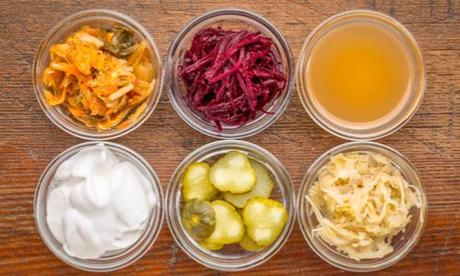
In your quest for foods or supplements that help with weight loss, you have probably noticed that there’s a vast amount of products on the market with less than credible claims in terms of their effectiveness. Nevertheless, one type of supplement that has gained a lot of popularity in recent years is probiotics, and this is largely due to its efficacy.
The term probiotics refers to a range of different microorganisms that provide an array of health benefits. Probiotics are a variety of roughly 400 types of “friendly” bacteria that live in the human digestive system and help to maintain a healthy balance of microorganisms in the intestines.
The largest and most well-known group of probiotic bacteria is lactic acid bacteria. The most commonly known of these is lactobacillus acidophilus, which you may have seen advertised in yogurt-based products and other fermented foods such as sauerkraut, kimchi, and kombucha
Probiotics are used in a range of different contexts and have many benefits:
- Helping to restore beneficial bacteria in the body after antibiotic usage
- In the treatment of symptoms of vaginal yeast and urinary tract infections
- Improves overall digestion health and function
- Vastly improves the absorption of nutrients from food
But, that’s not all. Over the last few years, evidence has mounted to support the usage of probiotics for weight loss. This article will further examine the evidence and other factors that will ultimately convince you that probiotics should become an essential component of your supplement regimen.
Prebiotics vs Probiotics: What’s the difference?
Now, before we go any further, let’s make sure we clear up any confusion that you might have between probiotics and prebiotics. According to Examine.com, prebiotics usually come in the form of fermentable fibers which help to support the population of bacteria in the human body.
These types of supplements essentially act as “food” for the microorganisms in your body even if they do not directly add additional bacterial strains to your digestive tract.
Examples of prebiotic foods include:
- chicory root
- raw garlic
- raw onion
- raw asparagus
Foods of this nature are all very much at work including in your diet to help support the proliferation of bacterial strains in your intestines.
To sum up the difference: probiotics is actual bacteria and prebiotics is food for bacteria.
How Probiotics Can Help You Lose Weight
There are a number of different ways in which you can add probiotics to your supplement regimen, in order to lose weight more effectively.
To illustrate this, we refer to a recent study conducted in 2017 which looked at the effects of adding probiotic supplements to a diet-based weight-reducing program in obese individuals.
This study set out to examine the effects of lactobacillus rhamnosus probiotics, and found that they had a profound impact on a number of factors such as appetite, mood, and even the restraint exercised by the individuals participating in the review.
Participants found that their appetites and food cravings were reduced, and the female subjects even experienced an improvement in their body image.
The amazing thing about this study is that it helps to further support the theories surrounding the relationship between the gut and brain – known as the gut-brain axis – and the impact it has on body weight management.
It seems likely that the improvement of microorganism levels in the gut will help to enhance nutrient absorption from food, thereby reducing appetite as the body is able to get more bang for its nutritional buck.
Further Scientific Evidence
This message was also presented in a 2016 study which took a broader view on the beneficial effects of probiotic strains like lactobacillus and bifidobacterium.
This study, which was published in Nutrition and Metabolism, found that supplementation with probiotics has a beneficial effect on glucose and fat metabolism, while also improving insulin sensitivity.
Insulin sensitivity is a vital aspect of weight loss because as your body becomes more sensitive to the effects of the hormone insulin, it becomes better at processing and metabolising carbohydrates. This makes them far less likely to be stored as body fat and far more likely to be used as fuel or stored in your muscles and liver as a substance known as glycogen.
Furthermore, probiotics can even help to reduce chronic inflammation throughout the body. This is good news for those of you who have suffered from inflammatory conditions such as osteoarthritis, with both direct and indirect links to longer-term weight loss.
How Much Probiotics (And When) Should You Take To Lose Weight?
Recommended dosages for probiotics vary wildly and can range from 1 – 40 billion colony-forming units or CFU per day. This is reflected in the details provided by different probiotic products on the market.
For example, Just Potent Probiotic Supplement has 35 billion CFU per serving while Advanced Strength Probiotic by BioSchwartz offers slightly more at at 40 billion CFU per serving.
And what about timing? At what point during the day should you be taking your probiotic supplement to ensure you receive the greatest benefit?
While there are certainly varying opinions and perspectives on the best time to take probiotics, it is important to consider that they need to be alive in order to provide the benefits within your body.
To ensure that the maximum amount of bacteria remain alive in your body when you take them, the best times for consumption tend to be when your digestive system is at its least active – namely, first thing in the morning or when you go to bed.
At these times of day, the acidity in your stomach will be lower certain bacteria have a better chance of survival .
On the other hand, timing is not necessarily an essential factor in the effectiveness of probiotic supplementation, and it may even be worth taking probiotics with meals if you suffer from bloating, gas, and poor digestion overall.
Should You Depend On Probiotics Only To Lose Weight?
Although there is a vast amount of very positive data surrounding the effectiveness of probiotics when it comes to weight loss, there is more to the equation than simply taking these supplements.
Practically all of the research conducted on the modulation of gut flora via probiotic supplementation involved subjects incorporating diet plans, exercise programs, or both.
With this in mind, we must emphasize that you cannot rely on a probiotic supplement alone to help you lose excess body weight. As with any supplement, you should use probiotics as an additional tool to bolster a solid diet and exercise regime.
Maintaining a realistic outlook on the impact that probiotics will have on your weight loss in this manner will ensure you avoid disappointment in the long run so that you are more likely to stick to your plan.
Potential Side Effects of Probiotics
The bacteria found in probiotic supplements typically already exist within your digestive system, meaning that you are not adding any foreign microorganisms into your body.
Probiotics have been consumed by humans for thousands of years in the form of the fermented foods we discussed above, and cultured milk products such as yogurt and kefir.
With this in mind, there do not appear to be any noteworthy side-effects associated with the supplementation of probiotics. You should, however, speak to your doctor before using any probiotic supplement if you are elderly or if you suffer from a weak immune system.
Things You Should Avoid
As we discussed above, they do not appear to be any serious side effects associated with probiotic supplementation. Nevertheless, we strongly recommend that you avoid using these types of supplements if you are allergic to bacteria strains such as lactobacillus acidophilus, streptococcus thermophilus, or bifidobacterium.
If in doubt, speak to your doctor about conducting tests to assess your tolerance to these bacterial strains.
The best recommendation we can make here is to always adhere to the usage instructions provided by the manufacturer of any probiotic supplement that you purchase. Error on the side of caution in this manner, as it will minimize any potential detrimental effects.
Tips To Make Probiotics More Effective for Weight Loss
To get the most out of your probiotic supplementation for weight loss, try the following tips:
- Prebiotic foods such as chicory root and raw garlic are very useful in supporting the population of beneficial microorganisms in your body. This means that you should definitely include as many prebiotic foods in your diet as possible if you are looking to make probiotics more effective for weight loss.
- Aside from this, common sense suggests that maintaining adequate hydration by drinking plenty of water will also support your digestive system, as will regular exercise is supported by quality rest.
- As long as you follow the usage instructions on your probiotic supplement to the letter, you shouldn’t have to do much more in order to ensure their efficacy.
- Microorganisms are clever little fellows that know exactly what to do once they find their way into your digestive tract, so you should be able to simply pop a capsule or two and go on with your day while they get to work inside your body.

